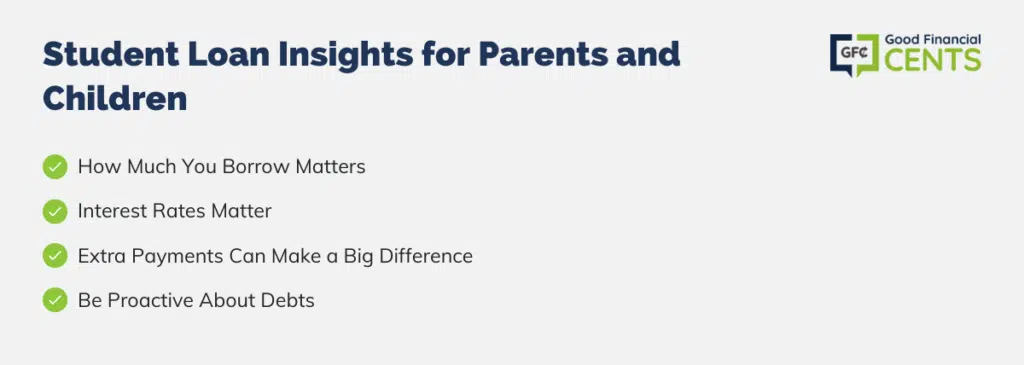As a financial advisor, I have come to realize that most people worry about the consequences of their actions when it’s far too late. This is definitely true when it comes to issues like not saving enough for retirement, and it’s also true when it comes to issues surrounding debt.
College student views on student loan debt are one example. According to a 2022 study from College Ave Student Loans, 77 percent of students who have student loans expect to leave college with student loan debt. Unfortunately, most still didn’t look at the average student loan debt amounts before they selected a school, and 56 percent said they didn’t know what their monthly payments would be after college.
In a world where many students borrow more than they need to, this is a troublesome picture. After all, how can you plan your financial future when you don’t know how much you need to borrow or how much your payment might be for the next 10 years or possibly longer?
With all of this in mind, I feel very strongly that parents should counsel their kids about all types of debt, including student loan debt. Parents need to feel especially comfortable discussing the financial sacrifices involved in funding college with their kids, including who is ultimately going to pay the bill. If the student is going to have to repay the entire balance, they should know that ahead of time. Likewise, parents should be honest and upfront about how much they’re able and willing to help.
Further, here are the main student loan issues every parent with kids approaching college should discuss before it’s too late.
Table of Contents
How Much You Borrow Matters
Way too many people think that any amount of student debt is a good investment. After all, your goal is moving through school, getting your degree, and getting the kind of job that will justify all your effort and the expense of attending college.
The thing is, college is not always a good investment. There are plenty of career fields where you don’t even need a college degree, and it’s possible to overpay for a degree depending on the school you choose.
If you wanted to be a social worker, for example, you might be able to attend a state school for around $30,412 per year according to the Social Work Degree Guide prepared by research.com, but you could also choose a private school that costs up to $57,250 in tuition and fees each year. You could even opt for an out-of-state school that won’t offer you a discount on tuition.
Either way though, the median annual wage for social workers worked out to $55,350 per year in May of 2022 per estimates from the Bureau of Labor Statistics.
Borrowing for college should never involve agreeing to “whatever it takes” to get the job done. Compare college costs ahead of time, and make sure the return on investment (ROI) makes sense for the degree you’re earning as well as your future salary prospects.
To help keep payments manageable after graduation, a general rule of thumb is to not have your child borrow more than what he or she expects to be his or her first-year salary out of college. One way to check to see what student loan monthly payments could look like (and if your child can afford them) is to use the College Ave Student Loans student loan calculator. Not only does it show you the total cost of the loan, but it also shows you what your monthly payment will be.
Interest Rates Matter, Too
Also be aware that your interest rate matters, as well as whether you qualify for subsidized or unsubsidized student loans. Where the government will cover the interest on subsidized loans while you’re still in school, unsubsidized loans begin charging interest right away. This is an important distinction since letting interest accumulate on your loans while you’re still in school can allow your loan balances to balloon.
The interest rate students pay on their loans also matters quite a bit, and families should be diligent about shopping around to make sure they’re getting loans with the best rates and terms they can qualify for. After all, $20,000 in student loans at 7% APR on a ten-year repayment plan would require a monthly payment of $232.22 and $7,865.87 in interest charges over the loan, whereas the same loan at 4% APR would require a monthly payment of $202.49 and total interest charges of $4,298.84.
Extra Payments Can Make a Big Difference
I also believe parents should explain that the repayment plan their graduates choose can make a huge difference in their loan experience. Where a shorter loan repayment period will result in a larger monthly payment, paying your loans off faster can help you get out of debt so you can move on with your life. A shorter repayment timeline can also dramatically reduce the amount of interest paid over the life of a student loan.
Making payments while still in school, even as small as $25 a month, can help save money over the life of the loan. Since some student loans can come without prepayment penalties, parents should also go over the benefits of paying more than the minimum payment on student loans. After all, extra payments that are allocated to the principal of their balances will reduce the amount they owe right away and help them save money on interest over the long run.
Need an example? Imagine someone with the scenario above who is paying off $20,000 in loans at 4% APR on a ten-year repayment plan. While paying $202.22 per month would leave them debt-free after ten years, they could save money and get out of debt faster if they were able to pay a little more. If they threw an extra $50 toward the principal of their loans each month, for example, they would save $1,044 in interest and shave 2 years and 3 months off their repayment timeline.
Look for ways where you may find an interest rate reduction. For instance, borrowers at College Ave Student Loans can receive a 0.25% interest rate reduction on their loan by setting up automatic payments through a valid bank account.
Be Proactive About Your Debts
Finally, I believe parents should advise their kids to be proactive about their debts if at all possible. This means borrowing only the money you need to earn a degree and looking for ways to minimize loans if at all possible.
On the other hand, being proactive doesn’t stop once you graduate from college. Students don’t have to stick with the student loans they have if other options are available, and they should consider the prospect of refinancing their student loans when they graduate and have good credit to get a better deal. While refinancing federal loans with a private lender can mean giving up benefits like deferment, forbearance, and income-driven repayment plans, private student loans can come with much lower rates and more flexibility in their repayment plans.

The Bottom Line
Weighing the pros and cons of refinancing always makes sense, so make sure your graduate puts in the effort and time required to consider all options available to them.







